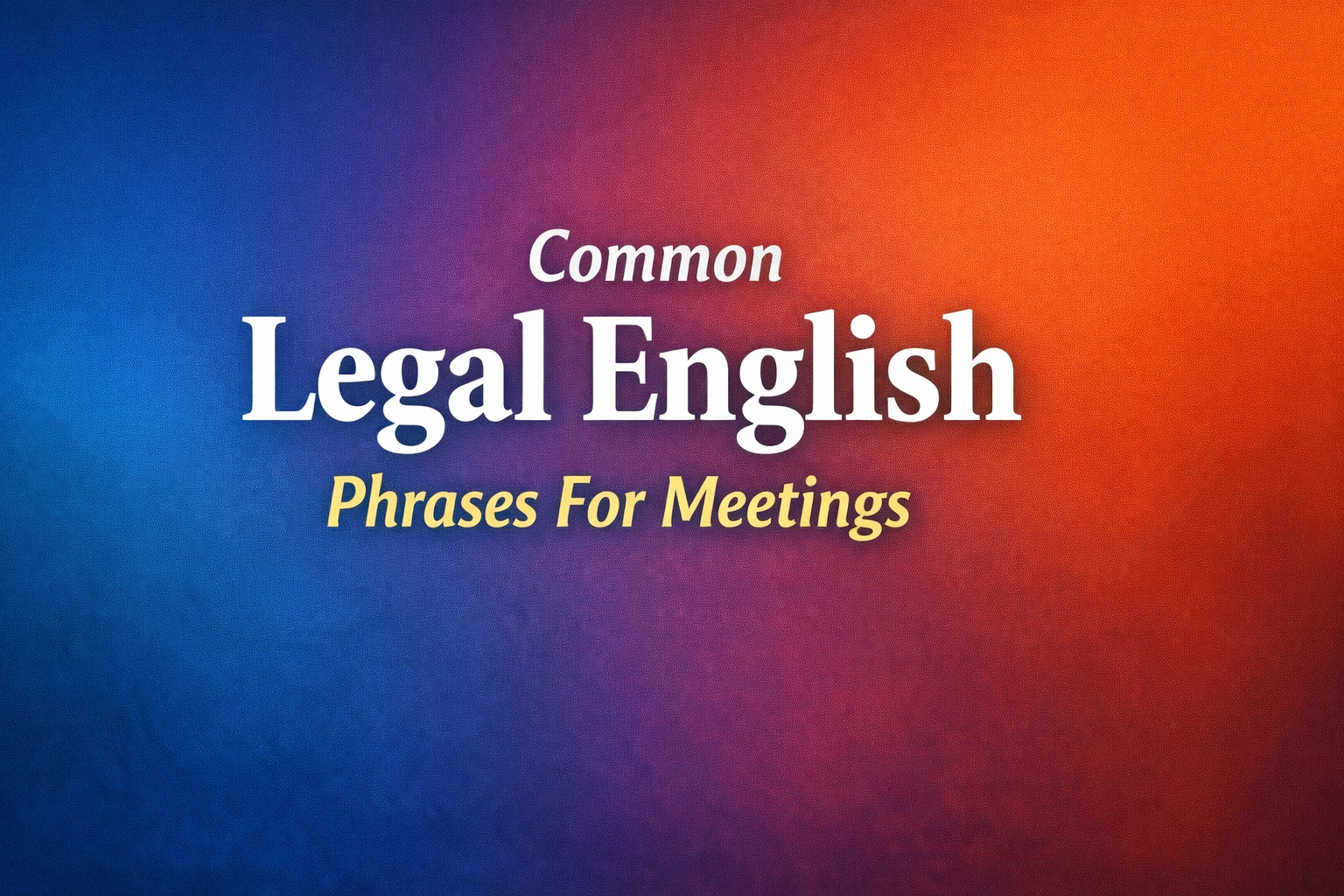Strengthen Your Communication Inside and Outside the Office with 27 Useful English Expressions for Lawyers in the Workplace
Introduction
For lawyers — especially those working with business teams or serving as in-house counsel — mastering everyday business English phrases is just as important as understanding legal terms. These expressions often appear in emails, meetings, and client conversations. Misunderstanding them can cause confusion, while using them correctly can build trust and professionalism.
Here are 27 useful phrases explained with their meaning, usage, and examples so you can understand and apply them with confidence.
Everyday and Useful Business Phrases That Lawyers Should Know
1. “Sorry to bother you”
- Meaning: A polite way to interrupt or ask for help.
- Usage: Used in emails or conversations before making a request.
- Example: “Sorry to bother you, but could you send me the final version of the contract?”
2. “Always at the last minute”
- Meaning: Describes something done just before a deadline.
- Usage: Often used to criticize procrastination or rushed work.
- Example: “He files his motions always at the last minute.”
3. “He threw me under the bus”
- Meaning: To betray or blame someone unfairly.
- Usage: Informal, common in office politics or disputes.
- Example: “During the board meeting, he threw me under the bus to save himself.”
4. “He didn’t look at anything”
- Meaning: Did not review the documents or materials.
- Usage: Refers to negligence or lack of due diligence.
- Example: “He didn’t look at anything before approving the budget.”
5. “He blames me for his own decisions”
- Meaning: Shifting responsibility unfairly.
- Usage: Often used when discussing accountability.
- Example: “He blames me for his own decisions about the merger.”
6. “Prepared an email”
- Meaning: Wrote or drafted an email.
- Usage: Standard workplace language.
- Example: “I prepared an email to update the client about the case.”
7. “A performance evaluation”
- Meaning: A formal review of someone’s work.
- Usage: Common in HR and employment law contexts.
- Example: “Her performance evaluation showed excellent progress.”
8. “Work and personal references”
- Meaning: People who can speak about someone’s professional or personal qualities.
- Usage: Often required in recruitment or background checks.
- Example: “The firm requested work and personal references before hiring.”
9. “Atypical”
- Meaning: Not usual; out of the ordinary.
- Usage: Useful when describing exceptions.
- Example: “It was an atypical case because the contract had no termination clause.”
10. “Behaved with” / “Get along with”
- Meaning: How someone interacts with others.
- Usage: Describes workplace conduct or relationships.
- Example: “He doesn’t get along with his colleagues, which creates problems.”
11. “Insubordinate”
- Meaning: Refusing to obey a superior’s orders.
- Usage: A formal HR and employment law term.
- Example: “The manager disciplined the employee for being insubordinate.”
12. “Followed directions”
- Meaning: Complied with instructions.
- Usage: Refers to obedience or compliance.
- Example: “She followed directions exactly as outlined in the memo.”
13. “Scapegoat”
- Meaning: A person unfairly blamed for others’ mistakes.
- Usage: Common in both legal and business disputes.
- Example: “He became the scapegoat for the project’s failure.”
14. “He did nothing”
- Meaning: A period of inaction or negligence.
- Usage: Often used in criticism or reporting misconduct.
- Example: “He did nothing for 5 days, which delayed the filing.”
15. “I am looking forward to it”
- Meaning: Expression of positive anticipation.
- Usage: Polite professional closing, especially in emails.
- Example: “I am looking forward to our meeting next week.”
16. “The buck stops with them”
- Meaning: They have final responsibility.
- Usage: Common in leadership or management contexts.
- Example: “The buck stops with the general counsel on compliance matters.”
17. “Immaturity”
- Meaning: Lack of development or judgment.
- Usage: Sometimes raised in conduct or capacity issues.
- Example: “His immaturity affected his ability to manage the case.”
18. “Collegially”
- Meaning: In a cooperative and respectful way with colleagues.
- Usage: Often used in professional or academic contexts.
- Example: “The partners worked collegially to finalize the deal.”
19. “I would have quit”
- Meaning: A hypothetical past action.
- Usage: Used to express how someone might have acted under conditions.
- Example: “If I had been in that situation, I would have quit.”
20. “Find a replacement” / “Find someone else”
- Meaning: To replace a person or role.
- Usage: Used in staffing and contract obligations.
- Example: “We need to find a replacement for the departing associate.”
21. “We don’t get along well” / “We don’t work well together”
- Meaning: There is conflict or poor cooperation.
- Usage: Common in workplace and partnership disputes.
- Example: “We don’t work well together on projects.”
22. “To him or her” / “He explained something to me”
- Meaning: Shows correct grammar for indirect objects.
- Usage: With the verb explain, English requires “to” before the person. You cannot say “He explained me something.”
- Example: “The judge explained the procedure to me.”
23. “What is your management style?”
- Meaning: A question about leadership approach.
- Usage: Common in interviews or performance reviews.
- Example: “The interviewer asked, ‘What is your management style?’”
24. “Indicative of”
- Meaning: Sign or symptom of something.
- Usage: Often used in analysis or arguments.
- Example: “His behavior was indicative of negligence.”
25. “Taking your job seriously”
- Meaning: Being committed and professional.
- Usage: Expresses dedication to work.
- Example: “She is known for taking her job seriously.”
26. “I wouldn’t mention it”
- Meaning: Advice to omit certain details.
- Usage: Used in sensitive disclosure contexts.
- Example: “I wouldn’t mention it during the negotiation.”
27. “Contentious” / “Heated argument”
- Meaning: Describes a serious dispute or argument.
- Usage: Common in litigation and negotiations.
- Example: “The discussion became contentious during settlement talks.”
Conclusion
Understanding these 27 phrases will help lawyers operate confidently in business and legal environments. Using them correctly will improve clarity, strengthen professional relationships, and demonstrate credibility in cross-border or in-house counsel settings.
Legal English Tutoring
Strengthen your legal or business English communication skills with personalized English tutoring.
Explore some of our other posts.
Disclaimer
DISCLAIMER: The content provided herein is only for discussion purposes and may contain errors. The reader is responsible to confirm the accuracy of the information provided. The content does not constitute legal or professional advice. We disclaim any liability for any loss or damage incurred directly or indirectly from the use of this information.









